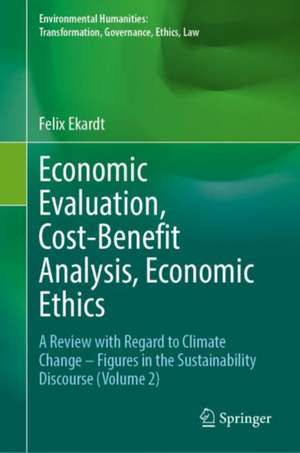Economic Evaluation, Cost-Benefit Analysis, Economic Ethics: A Review with Regard to Climate Change – Figures in the Sustainability Discourse: Environmental Humanities: Transformation, Governance, Ethics, Law
Autor Felix Ekardten Limba Engleză Hardback – 3 iun 2022
| Toate formatele și edițiile | Preț | Express |
|---|---|---|
| Paperback (1) | 775.30 lei 6-8 săpt. | |
| Springer International Publishing – 4 iun 2023 | 775.30 lei 6-8 săpt. | |
| Hardback (1) | 690.29 lei 3-5 săpt. | +18.87 lei 6-12 zile |
| Springer International Publishing – 3 iun 2022 | 690.29 lei 3-5 săpt. | +18.87 lei 6-12 zile |
Preț: 690.29 lei
Preț vechi: 862.87 lei
-20% Nou
Puncte Express: 1035
Preț estimativ în valută:
132.09€ • 138.19$ • 109.73£
132.09€ • 138.19$ • 109.73£
Carte disponibilă
Livrare economică 13-27 martie
Livrare express 26 februarie-04 martie pentru 28.86 lei
Preluare comenzi: 021 569.72.76
Specificații
ISBN-13: 9783030992835
ISBN-10: 3030992837
Pagini: 157
Ilustrații: XI, 157 p. 1 illus.
Dimensiuni: 155 x 235 x 17 mm
Greutate: 0.42 kg
Ediția:1st ed. 2022
Editura: Springer International Publishing
Colecția Springer
Seria Environmental Humanities: Transformation, Governance, Ethics, Law
Locul publicării:Cham, Switzerland
ISBN-10: 3030992837
Pagini: 157
Ilustrații: XI, 157 p. 1 illus.
Dimensiuni: 155 x 235 x 17 mm
Greutate: 0.42 kg
Ediția:1st ed. 2022
Editura: Springer International Publishing
Colecția Springer
Seria Environmental Humanities: Transformation, Governance, Ethics, Law
Locul publicării:Cham, Switzerland
Cuprins
Chapter 1: Problem and Fundaments.-Chapter 2. Idea-historical foundations and dubious (standard) objections to cost-benefit analysis.- Chapter 3. Frictions on the application level: costs and benefits, discounting, uncertainty, fact base.- Chapter 4. Collision of the cost-benefit analysis with liberal-democratic basic principles and the claim of validity of law.- Chapter 5. Cost-benefit analysis without convincing theoretical basis.- Chapter 6. Remaining relevance of cost-benefit elements in balancing.
Notă biografică
Prof. Dr. Dr. Felix Ekardt is Director of the Research Unit Sustainability and Climate Policy in Leipzig which he founded in 2009. Since 2009, he is also Professor for Public Law and Legal Philosophy at the Rostock University (Faculty of Law) as well as member of the Leibniz Science Campus on Phosphorus Research - as well as member of the Interdisciplinary Faculty (Department Knowledge-Culture-Transformation). His scientific focus as a lawyer, philosopher and sociologist lies in issues around human science sustainability studies (transformation, governance, ethics, law).
Textul de pe ultima copertă
With cost-benefit analysis, economic sciences cultivate a specific decision-making procedure, which has also been partially adopted in politics. Although economists do not experience the approach as normative, on closer examination the approach can be identified as an economic ethics. The present philosophical and at the same time transdisciplinary (with special legal and economic components) treatment examines the persuasive power of this approach using climate change as an example, as the most important sustainability issue. The objections raised against the economisation of decision-making with regard to the utilitarian tradition, such as the criticism of the orientation towards weighing up options, the alleged lack of distributive justice or the tendency to describe people in behavioural science as selfish, are hardly or not at all convincing on closer examination. In several respects, however, it turns out that cost-benefit analysis faces insoluble problems. Firstly, the theoretical basis of (hidden normative) cost-benefit analysis in philosophical empiricism does not seem tenable. This means the idea of empiricism that normative questions must be transformed into questions of factual (countable and reproduceable) preferences of people. Secondly, there are massive collisions of cost-benefit analysis with a liberal-democratic constitutional law, whose principles are universal ethical principles. This concerns both freedom rights (which must not depend on the ability of humans to pay) and the model of democracy and respect for the rule of law. Thirdly, insoluble problems of application arise for cost-benefit analyses, which are particularly (but not only) apparent in the context of climate protection, in general considerations as in the case of legislation as well as in individual analyses, as done when constructing a coal-fired power plant. A strongly deflated cost-benefit analysis could nevertheless contribute factual material – such as partial aspects of decision consequences that can actually be depicted in monetary terms – to ethical or legal decision-making processes. In this respect the approach appears helpful and complementary, but not beyond that.
Caracteristici
New (critical) approach to cost-benefit analysis Very interdisciplinary approach to decision theory Rearranging the role of economics in the sustainability and climate discourse



